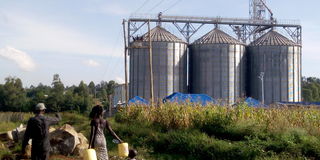Busia factory idle two years later

The Shs15b agriculture value-addition facility at Solo Village, Western Division, Busia Municipality, remains unutilised for more than two years. PHOTO | DAVID AWORI
A Shs15 billion agriculture value-addition facility in Solo Village, Western Division, Busia Municipality, remains closed two years after it was commissioned by President Museveni.
The facility was jointly funded by the African Development Bank and the Ugandan government under the Markets and Trade Improvement Programme II (MATIPII).
It is equipped with modern milling equipment, animal feeds processing plants, produce cleaning, drying sections and a 3,000-metric tonne cereal storage capacity.
Mr David Mayende, a resident of Solo Village, says when the facility was commissioned on December 1, 2020, many residents were optimistic that they would get jobs.
“When President Museveni opened the factory in 2020, we hoped to get jobs and quick money, but to-date the place has remained closed,” he says.
The Solo Parish chairperson, Mr Suleiman Mangeni Wacha, says the construction of the factory was “good news” .
“This is the first and only government-owned factory to be constructed in the entire (Busia) district. So, our hopes were that we would get jobs for our young people, which has not happened,” he says.
He adds that it is “disheartening” for a factory with the state-of-the-art equipment to be abandoned.
Mr Johnson Wafuba, the assistant town clerk of Busia Municipality, however, says the facility has not opened because the Ministry of Local Government had not secured a contractor to run it.
“When we [Busia Municipal Council] could not get a local contractor, the Ministry of Local Government took over the process of looking for one to run the facility, which had taken some time,” Mr Wafuba says.
He adds: “The ministry advertised and [later] managed to get a contractor, so very soon the waiting will be over for many Busia residents who have anxiously waiting to see the facility operate.”
Mr Wafuba says Obernster Road, which connects to the facility, will be tarmacked under the Uganda Support for Infrastructure Development (USMID) project, before the end of the month.
Mr Michael Kibwika, the Busia Resident District Commissioner (RDC), says once operational, the facility will add value to cereals.
“We hope that soon we should be able to have high quality products for both our local and foreign markets, which will lead to increased household income,” Mr Kibwika says.
Ugandan cereals have come under the spotlight after Kenya banned the importation of maize from Kampala in March 2021, citing high aflatoxins.




